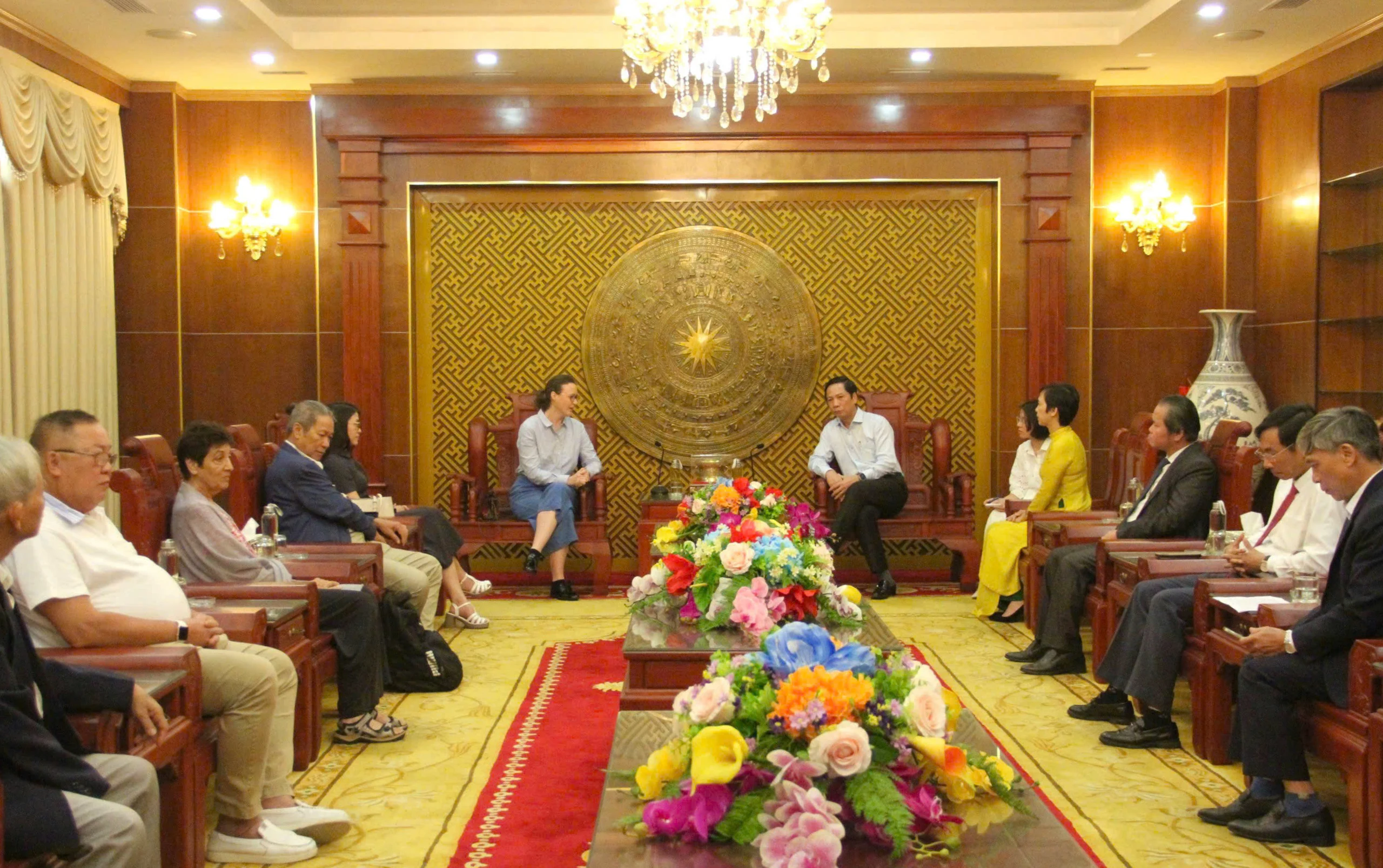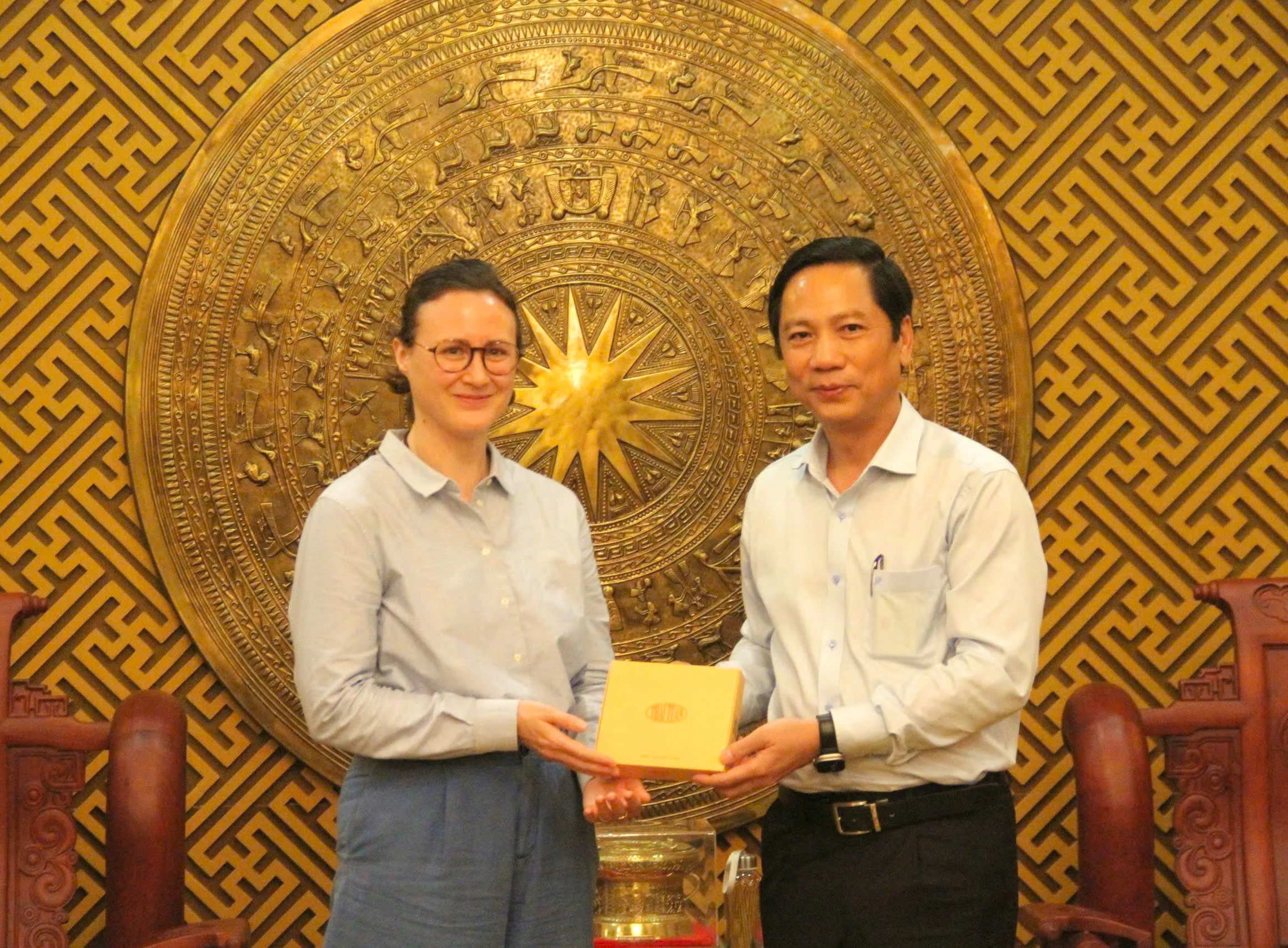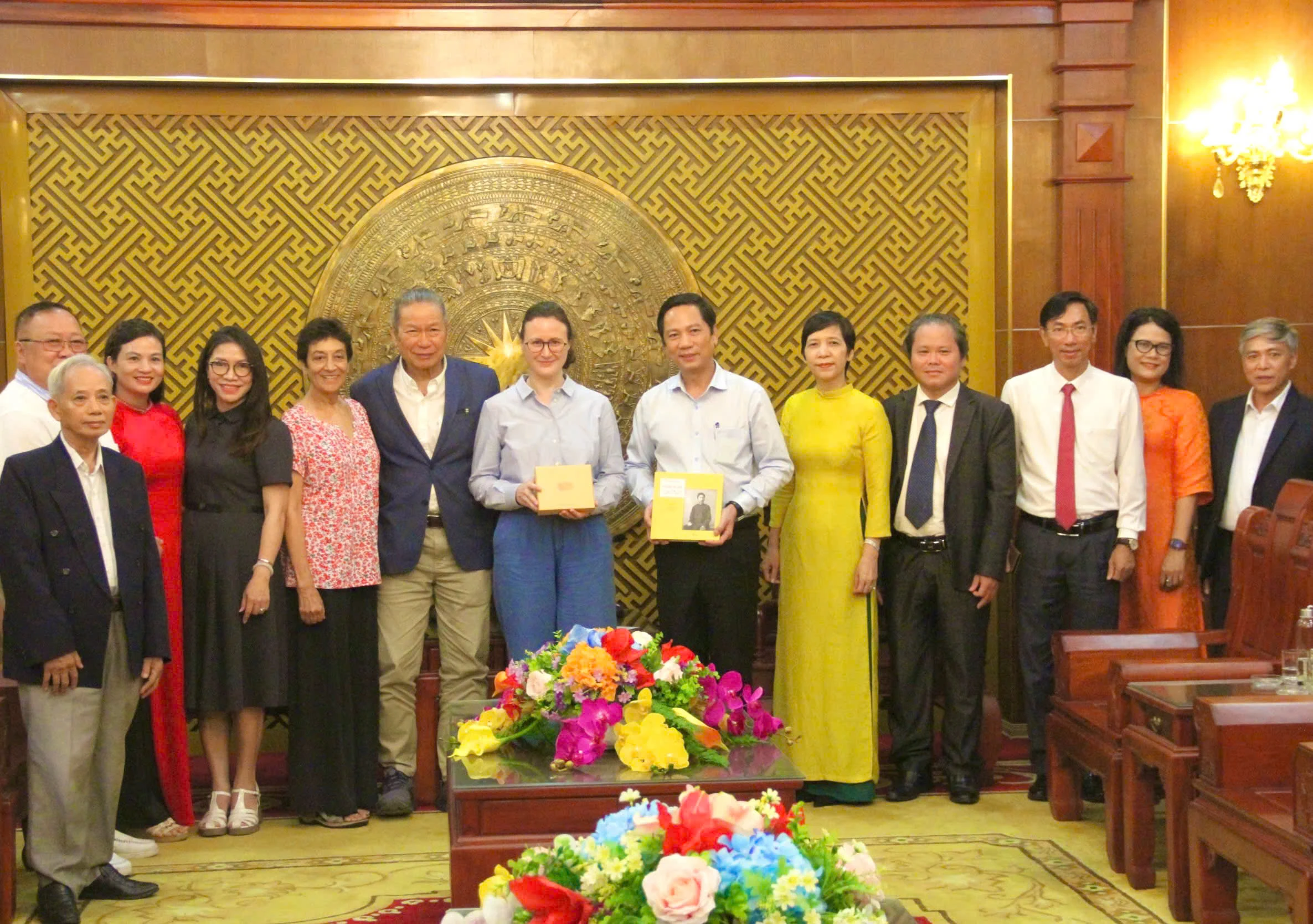{title}
{publish}
{head}
Dr. Amandine Dabat, a descendant of King Ham Nghi, has pledged to provide materials, images, artifacts and records related to the king and the Can Vuong (Save the King) movement.
This commitment reflects the dedication and aspirations of King Ham Nghi’s descendants, she told a meeting with Hoang Nam, Deputy Chairman of the Quang Tri Provincial People’s Committee on November 7.
She said that King Ham Nghi, during his exile, was cautious and maintained absolute secrecy, leaving his family with limited information about his life in that period.
Yet, his devotion to the country and longing for home were vividly expressed in the paintings he created during his exile, she said.

The meeting between Chairman of the Quang Tri Provincial People’s Committee Hoang Nam (right) and Dr. Amandine Dabat and her family. Photo: Hoai Nhung
She hoped that Quang Tri Province will share additional valuable insights on King Ham Nghi when he was still in Vietnam, particularly his connection to Cam Lo District.
Dr. Amandine suggested the province host more events related to the king, and restore and develop historical sites, making them meaningful destinations for future generations.
Her family will cooperate with authorities of Quang Tri Province and Cam Lo District to restore the old Tan So fortress.
She also extended her gratitude to the provincial and district authorities for their deep respect and dedicated efforts to honor King Ham Nghi in recent years.
She said that her family are touched by the province’s efforts to organize the launch of the book titled “Ham Nghi: The Exiled Emperor – the Artist in Algiers”, and open an exhibit space for artifacts and historical documents related to the king and his movement.

Deputy Chairman Hoang Nam hands Dr. Amandine Dabat a present. Photo: Hoai Nhung
Deputy Chairman Nam, for his part, requested that Dr. Amandine and her family continue to support by contributing more precious materials about King Ham Nghi, especially from his exile in Algeria.
This would further enrich the historical and cultural value of the Tan So National Heritage Site, deepening the understanding of the young king’s patriotism and resolve to resist foreign invasion, he said.
These materials will assist the province to restore the fortress, Deputy Chairman Nam noted.
Quang Tri has built a temple of King Ham Nghi and the Can Vuong soldiers, and plans to construct a museum dedicated to the Can Vuong movement, he said.
He emphasized Quang Tri Province’s deep respect for King Ham Nghi, who remained devoted to his homeland and deeply mourned its loss, despite his exile far from Vietnam.

Group photo of Deputy Chairman Hoang Nam, Dr. Amandine Dabat, and her family. Photo: Hoai Nhung
On November 7, the province inaugurated an exhibit space for artifacts and records on King Ham Nghi and the Can Vuong movement. This significant event honors the patriotic king and contributes to preserving and enhancing the historical value of the Tan So National Heritage Site, while celebrating the upcoming 140th anniversary of the Can Vuong Edict issued by King Ham Nghi. The occasion also serves to strengthen ties between Cam Lo District and King Ham Nghi’s descendants residing both in Vietnam and abroad.
Over 140 years ago, the Nguyen Dynasty built Tan So City as an alternative capital in case Hue was about to be conquered. On July 5, 1885, following the fall of Hue, King Ham Nghi, along with his retinue, traveled to Cam Lo and issued the Can Vuong Edict, calling on all people to join in resisting the French.
Hoai Nhung - Huy Anh

QTO - The events aim to promote a culture of exercise and competitive sports, while also showcasing the province’s tourism potential and strengths.

QTO - In July, the central province of Quang Tri welcomes people from all parts of the country who silently come to this land to pay their tribute to...

QTO - The national museum in Quang Tri aims to preserve war memories, promote peace, and attract cultural tourism.

QTO - The People’s Committee of the central province of Quang Tri is calling for financial support from the Industrial Nank of Korea (IBK) to build a new...

All the explosives have been destroyed to ensure the safety of the community.

QTO - Quang Tri Province has successfully constructed, renovated, and brought into operation 28 commune health stations under the investment project for...

QTO - The Quang Tri Provincial People’s Committee on October 22 approved the project document for “Enhancing Community Climate Change Resilience,” which is...

QTO - The Ministry of Transport has sent a document to the Quang Tri Provincial People’s Committee, the Vietnam Maritime Administration, and a consortium...

QTO - The Quang Tri Military Command during the 2024-2025 dry season is tasked with the mission of searching for and repatriating the remains of Vietnamese...

QTO - Deputy Chairman of the Quang Tri People’s Committee Hoang Nam on October 21 received a delegation of Veterans For Peace (VFP) – Chapter 160 Vietnam...

QTO - The Hanoi-based Kinh te & Do thi (Economic & Urban) Newspaper on October 17 officially launched its Converged Newsroom and Digital Ecosystem,...

QTO - As part of his ongoing visit to Quang Tri Province, General Secretary and State President To Lam on October 16 met the Quang Tri Provincial Party...